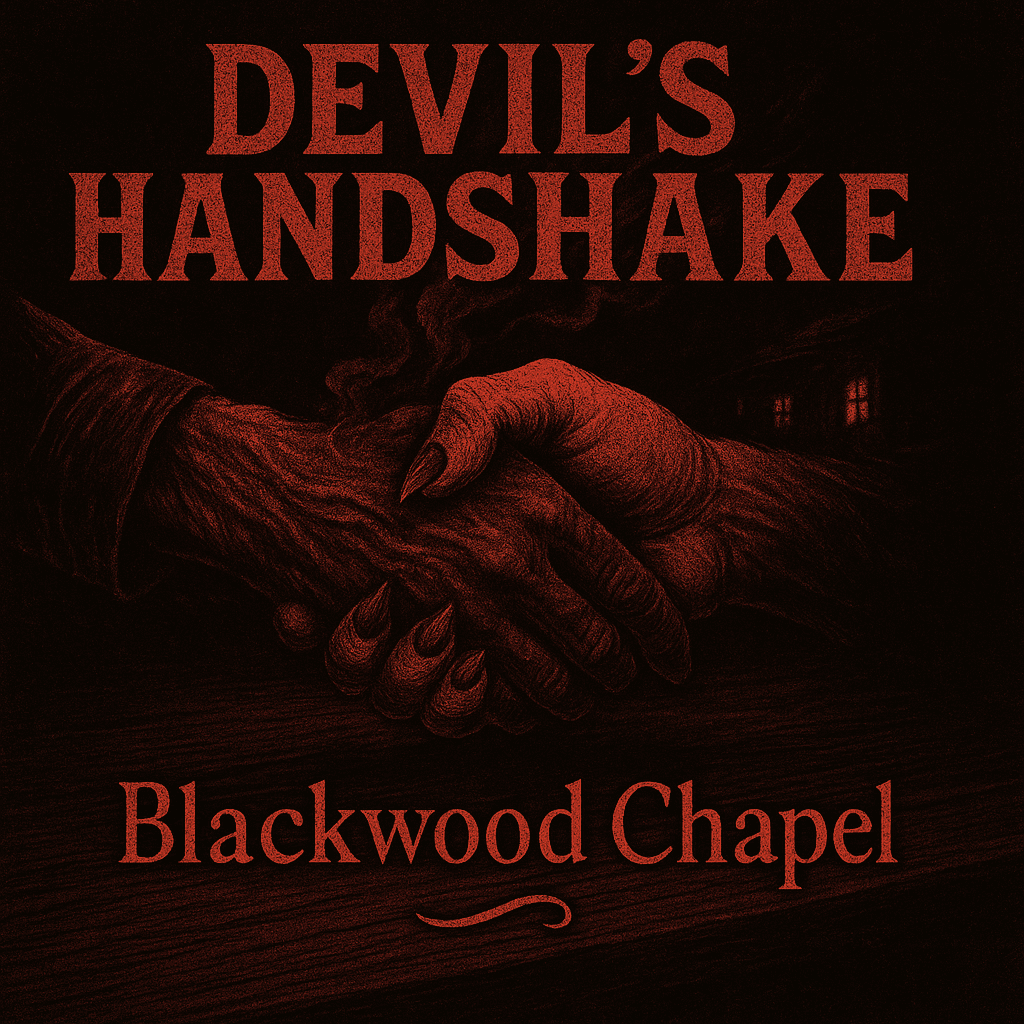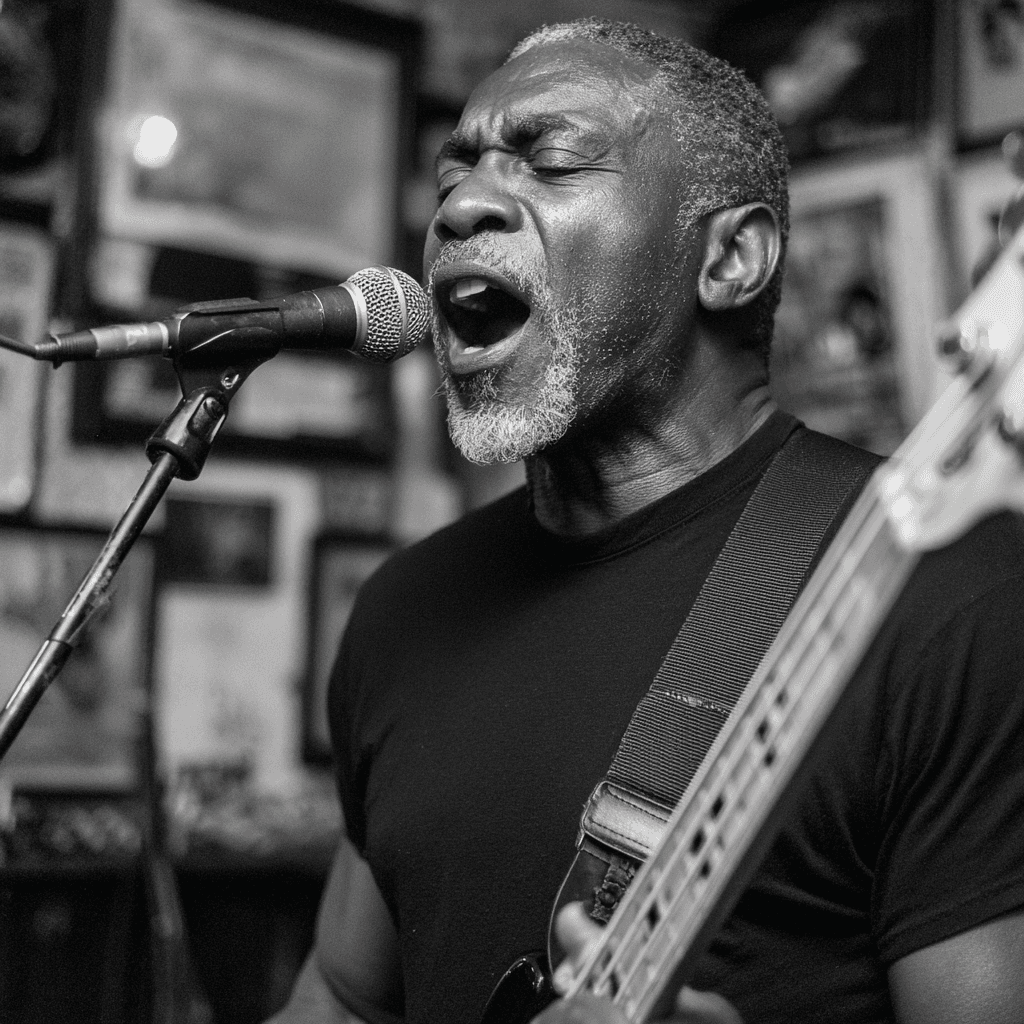
Blackwood Chapel
4 Piece band, Rock, Folk, Country, Blues, Americana
Wade Corrigan lead singer Blackwood Chapel
About Blackwood Chapel
BLACKWOOD CHAPEL
Four Souls, One Sound
In the saturated landscape of modern music, where authenticity is often manufactured and rebellion commoditized, Blackwood Chapel emerges as something genuinely rare: a band that creates not because they want to be heard, but because they need to be understood.
This four-piece collective—anchored by dual vocalists Wade Corrigan and Okram Byron, alongside their rhythm section—operates from a philosophy as uncompromising as their sound. They are musical archaeologists, excavating truths from the sediment of contemporary life and presenting them without polish or pretense.
The Foundation
Wade Corrigan, the band's guitarist and primary songwriter, brings the steady pulse of lived experience to every composition. His approach to music mirrors his approach to life: methodical, authentic, uninterested in shortcuts. Corrigan's guitar work doesn't showboat—it serves the song, creating sonic landscapes that support rather than dominate the narrative. His writing draws from literary wells as deep as they are diverse, filtering complex social observations through the lens of working-class wisdom.
Okram Byron provides the perfect counterpoint as co-vocalist, bringing his own interpretive power to Corrigan's compositions while contributing to the band's collective creative vision. The interplay between these two voices, singing on alternate songs—Corrigan's weathered certainty and Byron's rich and soulful tones —creates the kind of vocal chemistry that can't be taught or manufactured.
The rhythmic anchor of Blackwood Chapel, Thea Marlowe approaches the bass with the precision of a surgeon and the soul of a poet. A classically trained violinist who discovered her true calling in the low-end frequencies, Marlowe brings an unexpected melodic sensibility to what many consider a purely rhythmic instrument.
Her background in chamber music informs her approach to space and dynamics—she understands that what you don't play is often as important as what you do. This philosophy aligns perfectly with Blackwood Chapel's aesthetic of meaningful restraint. Marlowe's bass lines serve as both foundation and counterpoint, weaving through Corrigan's guitar work with architectural precision.
Notoriously private even by the band's standards, Marlowe lets her instrument speak for her. Those who've worked with her describe a musician who arrives prepared, listens intently, and contributes exactly what each song requires—nothing more, nothing less. Her technical mastery remains hidden beneath an approach that prioritizes song service over showmanship.
Behind Blackwood Chapel's measured intensity sits Emmett Cross, a drummer who treats his kit like a conversation rather than a declaration. Cross's approach to rhythm mirrors the band's overall philosophy: power through purpose, impact through restraint.
A former jazz student who found his calling in alternative rock, Cross brings both technical sophistication and emotional intelligence to the drum throne. His playing breathes with the songs, expanding and contracting in response to the narrative demands of Corrigan's compositions. Where many drummers fill space, Cross creates it.
His setup reflects his philosophy—a deliberately minimal kit that forces creativity through limitation. Cross believes that constraints breed innovation, a mindset that serves Blackwood Chapel's aesthetic perfectly. His rhythmic choices feel inevitable rather than obvious, supporting the band's emotional architecture without drawing attention to the construction.
Friends describe Cross as the band's quiet philosopher, someone who processes the world through rhythm and finds meaning in the spaces between beats. His drumming reflects a deep understanding that in music, as in life, timing is everything.
The Collective
Together, these four musicians create something larger than their individual contributions. Corrigan and Byron handle the vocal and lyrical storytelling, while Marlowe and Cross provide the emotional and rhythmic foundation that allows those stories to resonate.
Each member brings their own relationship with restraint and purpose, creating a band that operates more like a chamber ensemble than a traditional rock group. Their years of private creation have forged an almost telepathic musical communication—they play not just with each other, but for each other, in service of something greater than personal expression.
This is Blackwood Chapel: four individuals who've chosen to disappear into the music, allowing their collective voice to speak truths that solo careers never could.
The Philosophy
Blackwood Chapel operates on the principle that music should disturb the comfortable and comfort the disturbed. They tackle controversial subjects not for shock value, but because meaningful art demands engagement with uncomfortable realities. Their songs function as both personal confessions and social commentary, delivered with the conviction of artists who understand that platforms come with responsibilities.
"We're not here to be personalities," reflects the band's collective ethos. "We're here to serve the songs." This philosophy extends to their minimal social media presence and selective media engagement—choices that feel radical in an attention-economy age.
The Sound
Drawing from roots rock, alternative, and folk traditions while remaining thoroughly contemporary, Blackwood Chapel's music defies easy categorization. Their arrangements breathe with the confidence of musicians who understand that space and silence can be as powerful as sound. Each track reveals new layers upon repeated listening—a testament to songcraft that prioritizes depth over immediate gratification.
The band's forthcoming album, Still Waters Rising, promises to establish them as a necessary voice in underground music circles. Their debut single "Devil's Handshake" offers a glimpse into their world—one where moral complexity is explored rather than simplified, where questions matter more than easy answers.
The Present Moment
After years of private creation, Blackwood Chapel's decision to share their music with the world feels less like career ambition and more like artistic necessity. They emerge at a time when authentic voices are both desperately needed and increasingly difficult to find, offering substance in an era of spectacle.
In choosing to step forward now, Blackwood Chapel signals their readiness to engage with a world that often seems to value noise over nuance. Their music serves as a reminder that the most powerful revolutions begin not with raised fists, but with raised consciousness.
'Devil's Handshake,' the first single from Blackwood Chapel's forthcoming album 'Still Waters Rising,' is now available on all streaming platforms.
Gallery

Wade Corrigan

Okram Byron
